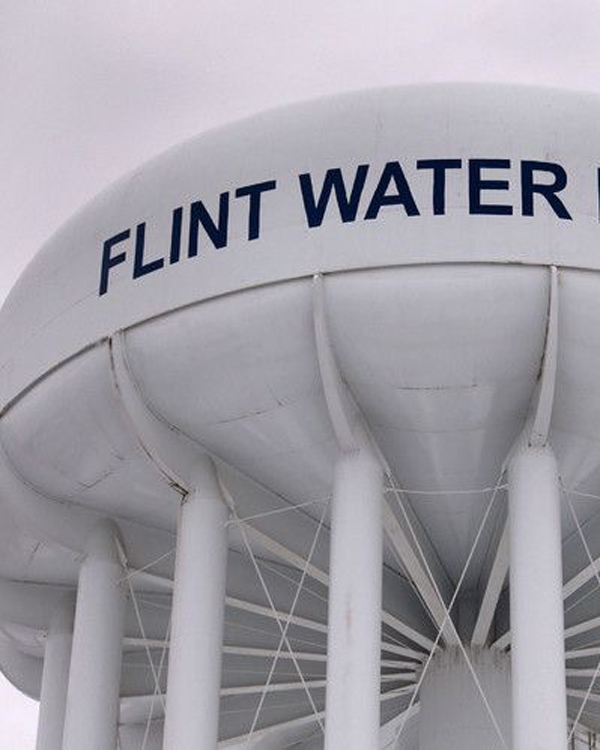
- Industry
Docs: “Flint” (2020) – A Riddle Not Yet Solved?
The water catastrophe in Flint, Michigan, a city located roughly one hour northeast of Detroit, was a manmade disaster of epic proportions — an event that rocked the conscience of an entire nation and even garnered international attention.
Beginning in 2014, most of the city’s 100,000-plus residents suffered exposure to contaminated water. Many ingested levels of lead up to 70 times over the safety limit recommended by the Environmental Protection Agency. The still-developing brains of children were especially at risk. Thousands will face significantly increased likelihoods of cognitive functioning impairment, as well as Alzheimer’s disease.
Directed by Anthony Baxter, executive-produced and sparingly narrated by Golden Globe winner Alec Baldwin, the forthrightly titled documentary Flint, available now across streaming platforms, tells the story of a sprawling crisis which culpability and after-effects are still winding their way through the American court system.
What could be just another portrait of social health tragedy in the modern age, however, eventually develops into a fascinating disquisition on broken public trust, the moral weight of inflated panic, and the sometimes-bad consequences of good-faith actors.
Like Erik E. Crown’s Florida-set Phosfate, which explores similar themes by way of a story about disease linked to deregulation and environmental pollution, Flint casts its lot with local activists. It is from them that it wrings a substantial emotional connection. It’s utterly heartbreaking to see a little boy, not yet 10 years old, fight back tears about the impact of toxic water on his younger brother; or watch a deaf girl telling us that she doesn’t want to lose her mother because she’s her “favorite one.”
After this set-up, and a bit of backstory on the city’s history and industrial abandonment, Flint charts a trajectory of ill-considered cost-cutting measures, dirty water, slow reaction and/or cover-up. The 2014 switch, from water previously sourced from Lake Huron to the local Flint River, failed to account for the latter’s highly corrosive nature that ended up stripping coated lead from old underground pipes. People bottle cloudy brown water from their faucets, only to be told it’s fine to drink or bathe in.
Virginia Tech professor Marc Edwards spearheads important research that validates the concerns of Flint’s residents. As local officials equivocate, Michigan governor Rick Snyder struggles to formulate a coherent plan to address the emergency. Actor-activist and Golden Globe winner Mark Ruffalo comes to town with his nonprofit organization Water Defense and its “chief science officer” Scott Smith to conduct their own testing.
After 18 months, the decision is made to switch the water source back to Lake Huron. Nevertheless, more cost-cutting at the expense of public health is indulged. Eventually, Snyder and other government officials come clean about a hushed-up outbreak of Legionnaire’s disease that kills at least 12 people. It’s a rolling catastrophe.
Baxter is an award-winning British filmmaker whose credits include a trilogy of movies that examine how land developers like Donald Trump use golf courses as an excuse to build sprawling private resorts at the expense of both delicate ecosystems and local economies. His films are pointedly investigative, and while he doesn’t insert himself into proceedings to quite the same degree as activist-filmmaker (and Flint native) Michael Moore, neither does he shy away from it. Most crucially, Baxter brings an outsider’s perspective to this tangled and in some ways uniquely American crisis. That proves to be incredibly important.
For much of its running time, Flint unfolds at a somewhat languid pace, as a noodling document of bureaucratic dawdling and failure. With footage spanning nearly six years, the film seems a bit uncertain about how to bring definitive form to the tragedy it is purporting to chronicle. Using establishing drone footage to solid effect, Baxter locates and communicates a genuine sense of decimated municipality, but seems lost in the weeds of its particulars. Then, a surprising thing happens.
In its last 35 to 40 minutes, both the movie’s editorial focus and sense of overall intrigue sharpen dramatically, abetted by several wild and largely unforeseen twists.
After the fallout from a rather tone-deaf Flint appearance in May 2016, by then-President Barack Obama (who famously sipped filtered water while on stage giving a speech), the divergences in data between Water Defense’s Smith and the EPA becomes more drastic, and differences in their informed advice more pointed.
Edwards goes on the offensive regarding Scott’s methodology, prompting cries of betrayal by local activists; Smith, possessing no science degree, offers up a vague mea culpa that seemingly confirms him to be less a figure of follow-the-facts truth than a very impassioned eco-zealot peddling his own proprietary inventions. Perhaps most shocking, a Flint resident is slapped with a $3 million defamation lawsuit by an offended party.
Against this muddied ethical backdrop, $30 million of taxpayer money is spent both prosecuting and defending former government officials in the wake of the scandal. In the film’s final 10 minutes, Baldwin is seen traveling to Flint so that he can meet with some of the affected townspeople.
The overall film, then, blossoms into a larger examination of truth itself in the modern era. What is taken as fact and what is considered opinion in our digital age? Is well-meaning activism that attacks bureaucracy almost instinctually, but without engaging in transparency or being held to any scientific standards, actually as bad or even worse than the sins of public abuse it seeks to expose? Is there, or should there be, a greater standard of responsibility in disadvantaged communities that lack the tools for meaningful governmental oversight?
These are heavy questions, intertwined with – but, also, separate from – this particular calamity. In some ways, Flint’s compromised structure makes it feel like a riddle not yet solved. Its very messiness reflects the complicated tragedy of the Flint situation in ways that a more rigorously editing job could never achieve. It breaks your heart — in ways both predictable and unexpected.
For more information, visit www.FlintDocumentary.com.

